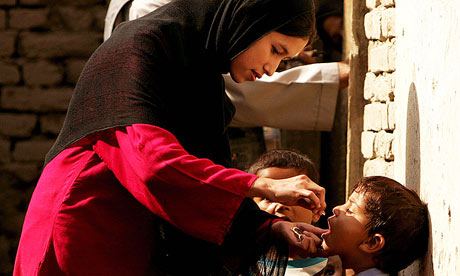A health worker gives a dose of polio vaccine to a child in Afghanistan, one of just three countries where polio is still endemic. Only two thirds of children in Kapisa are vaccinatedA student and volunteer on a polio vaccination programme has been murdered by gunmen in an eastern Afghan village, leaving many women too frightened to attend work and school, according to a member of parliament for the area. Anisa, who had just finished 10th grade at school, was shot outside her home in Kapisa province on Saturday morning and died later in hospital, with six bullets in her stomach. But although officials, activists and security forces agree she was shot dead, reports differ about who was responsible. The victim had already survived a murder attempt the day before she died, taking shelter in a neighbour's house when gunmen opened fire on her in the street, said Sima Matim, a Kapisa provincial council member, who believes insurgents were behind the killing. "She hadn't realised a group was following her and was very afraid," said Matim, who has herself been threatened for working outside the home, and says she often feels like she is being watched. "Two times these groups called me and told me to stop my job. They told me my address and described my home to me. They said 'we know everything about you and you have to stop your job'. "I worry about when I will be killed and what my destiny will be. My husband always tells me to stop work, but still I am trying to continue." The violent deaths of women often go unreported or unresolved in Afghanistan, a country where senior clerics this year described them as "secondary" to men. Heather Barr, Afghanistan researcher at Human Rights Watch, said: "The small number of cases of prosecution of violence against women speaks to a lack of enthusiasm on the part of police and prosecutors to get to the bottom of these cases." Guidelines issued by the clerics said women were subordinate to men, that they should not mix in work or education, and must always have a male guardian when they travel. The edicts appeared in a statement that also encouraged insurgents to join peace talks, fuelling fears that any successful negotiations would come at a high cost to women. Anisa was an orphan in her early 20s, old for her grade at school in part because she tried to support her family while studying, said Tahera Mojaddidi, a member of parliament and former teacher who knew her. War and poverty means it is not unusual for Afghan children to miss or repeat several years at school. The morning she was murdered, Anisa got a phone call from her killers shortly before she left for work at the clinic where she volunteered on a polio eradication programme, Mojaddidi said. Afghanistan is one of three countries where polio is still endemic, and only two thirds of children in Kapisa are vaccinated, according to United Nations figures. When Anisa stepped outside, six bullets were pumped into her stomach, said the MP, who added that she had discussed the shooting with intelligence officials from her home province. She said she believed the Taliban were behind the killing. "In the village, families are saying that from the time when Anisa was killed up until now, their girls cannot go to schools, women who are working for organisations, they do not dare go out, because they think if they do their destiny would be the same as Anisa's." A Taliban spokesman denied any role in the shooting, and said the group was not against polio vaccines. The Pakistani Taliban this summer in effect banned polio eradication in South Waziristan, one of the most troubled areas of Pakistan. Several Kapisa officials also denied a Taliban role in her killing. The provincial director of women's affairs, Saifoorah Kohistani, said there were no Taliban in Anisa's area and the government was looking into possible motives for the shooting. The provincial governor would say only that an investigation was under way. Police said Anisa was caught in crossfire after a fight escalated in an area where most men carry guns. Mohammad Makhfous Walizada, deputy provincial police chief, said he had testimony from her brother, who carried the dying girl to hospital. Walizada said he had arrested a man, who was now being questioned. He was backed up by another MP, Haji Agha Jan. "Someone told me it was two brothers or two cousins fighting. Everyone has Pakistani pistols there, one of them opened fire, the bullets mistakenly hit the girl and she was killed," said Jan. Mojaddidi said officials were not interested in looking into such attacks; their insistence that the shooting was accidental was just an excuse, she said. "It's all some stories that the officials of Kapisa made up, to cover that there is violence against women."
M WAQAR..... "A man's ethical behavior should be based effectually on sympathy, education, and social ties; no religious basis is necessary.Man would indeed be in a poor way if he had to be restrained by fear of punishment and hope of reward after death." --Albert Einstein !!! NEWS,ARTICLES,EDITORIALS,MUSIC... Ze chi pe mayeen yum da agha pukhtunistan de.....(Liberal,Progressive,Secular World.)''Secularism is not against religion; it is the message of humanity.'' تل ده وی پثتونستآن
Thursday, December 6, 2012
Afghan gunmen kill polio vaccination worker in latest attack on women
Subscribe to:
Post Comments (Atom)

No comments:
Post a Comment